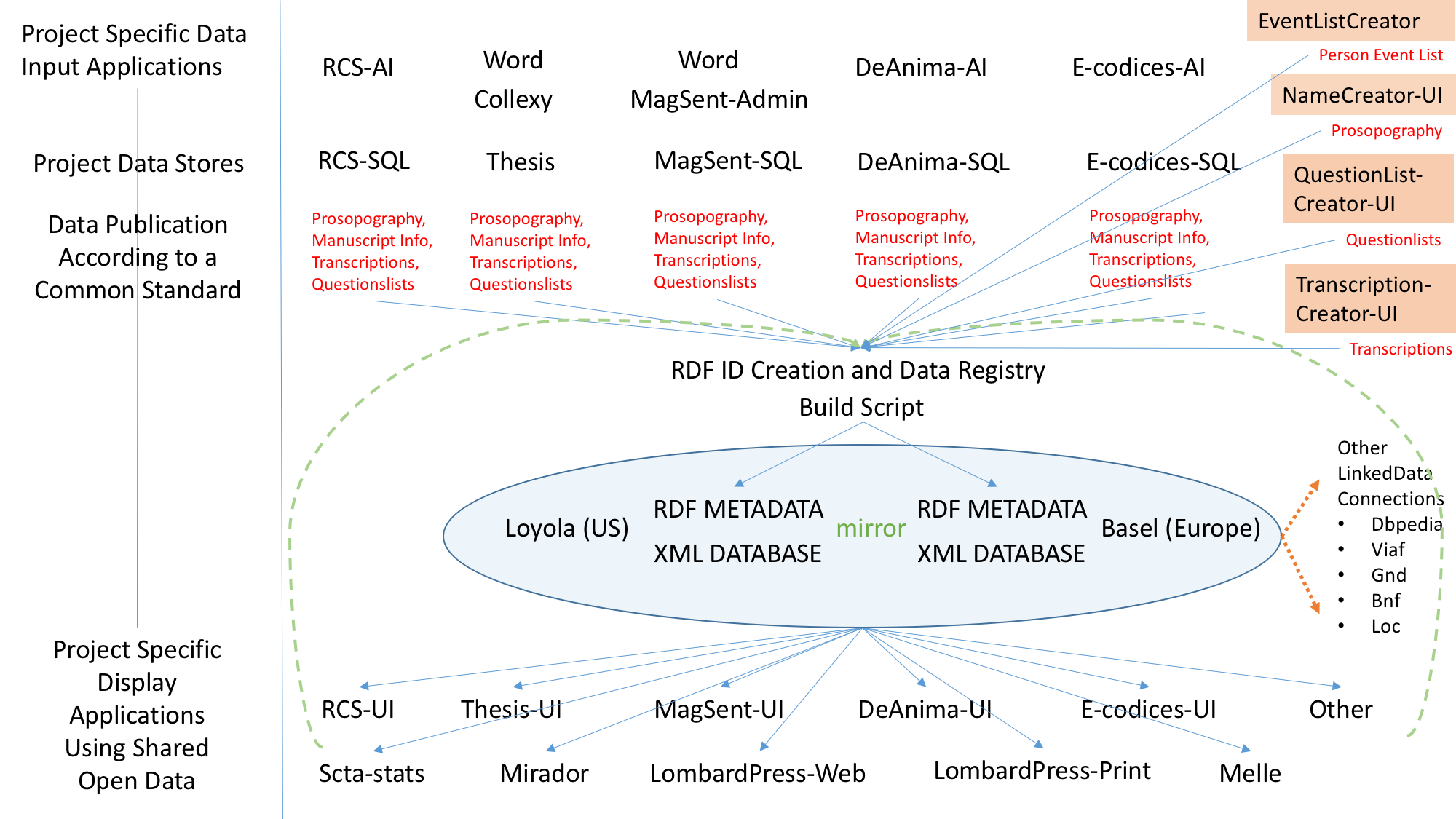Texts as Networks: The Promise and Challenge of Publishing Humanities Texts as Open Data Networks
Jeffrey C. Witt (Loyola University Maryland) | @jeffreycwitt
University of Helsinki, Helsinki, Finland, December 1, 2016
Slide Deck: http://lombardpress.org/slides/2016-12-01-helsinki-open-science/
Problems and Aspirations
At present, the medieval corpus is an invisible tapestry
We want to provide a scientific view of each thread within the context of the whole.
A scientific view through computer assisted:
- Analysis
- Search
- Access
- Synthesis
The Current Paradigm
Text-as-Document
The problem with the text-as-document approach
Data Isolation: in print and on the web








In sum: research groups are currently choosing the most inefficient way possible to make data avaialable on the web, while leaving us with results that go barely beyond the capabilities of the printed page.
A New Paradigm
Text-as-Network
Despite the inarguable benefits the Web provides, until recently the same principles that enabled the Web of documents to flourish have not been applied to data. Traditionally, data published on the Web has been made available as raw dumps in formats such as CSV or XML, or marked up as HTML tables, sacrificing much of its structure and semantics. In the conventional hypertext Web, the nature of the relationship between two linked documents is implicit, as the data format, i.e. HTML, is not sufficiently expressive to enable individual entities described in a particular document to be connected by typed links to related entities.
Christian Bizer, Tom Heath, Tim Berners-Lee, "Linked Data - The Story So Far", http://tomheath.com/papers/bizer-heath-berners-lee-ijswis-linked-data.pdf
Challenge 1: modeling a distributed corpus
Our Data




Our Data Model
- WorkGroup
- Work
- The idea of Moby Dick
- Expression
- The idea of Melville's expression (as opposed to a screen play expression)
- Manifestation
- The idea of the 1959 edition of Moby Dick
- Item
- One physical copy of the 1959 edition in a particular library
- Transcription
- the idea of a digital transcription of the 1959 edition of Moby Dick
- includes properties like hasXML, hasJson, hasPlaintext, hasHtml
- Manifestation Surface
- the idea of page 1 in 1959 edition of Moby Dick
- Item Surface
- the physical page 1 in a particular copy of the 1959 edition of Moby Dick
- IIIF Canvas
- IIIF image annotation
- images taken of the physical page 1 in a particular copy


Creating the data set with RDF extraction

Using the Network
Critical Corpus Database Visualization

Building common libraries for accession the text-network
https://github.com/lombardpress/lbp.rb
Lbp Web Interface





Lbp Print Interface


Challenge 2: Announcing relationships to related resources
Webmentions and Linked Data Notifications





Challenge 3: Community Buy-In: "The Cathedral and the Bazaar"
https://en.wikipedia.org/wiki/The_Cathedral_and_the_Bazaar http://www.theatlantic.com/magazine/archive/2006/09/the-hive/305118/
Suggested Readings
Introduction
http://lombardpress.org/2016/08/02/bcht-scta-lbp-overview/
Modeling and Workflows
http://lombardpress.org/2016/06/12/DTS-modeling-proposal/
http://lombardpress.org/2016/08/09/surfaces-canvases-and-zones/
http://lombardpress.org/placing-medieval-texts-within-a-critical-corpus/
On Information sharing and linked open data
http://lombardpress.org/2016/04/16/iiif-webmentions/
http://lombardpress.org/2016/08/25/basel-workshop-report/
On Peer Review
http://lombardpress.org/2016/05/19/the-traveling-imprimatur/
On LombardPress web
http://lombardpress.org/bringing-ecodices-and-openn-together/
http://lombardpress.org/conceiving-the-digital-critical-apparatus/
http://lombardpress.org/demo-of-full-integration-of-iiif-images-into-lombardpress/